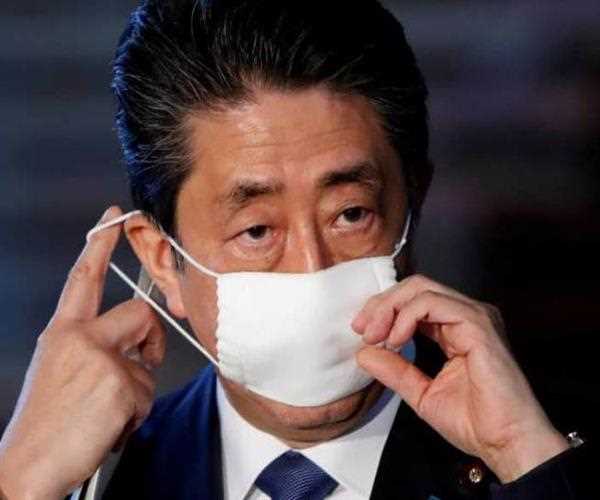
15-Apr-2020
Shinzo Abe's Delicate Methodlogy Against Corona Pandemic
Japanese Prime Minister Shinzo Abe a week ago announced a highly sensitive situation because of the country's rising COVID-19 diseases. Be that as it may, the measure, made conceivable by an ongoing correction to the law against irresistible ailments, just enabled governors of the assigned problem area prefectures to demand residents and private organizations to rehearse social separating, for example, limiting trips, telecommuting, and shutting or diminishing hours of the organizations. The absence of implementation arrangements, for example, fines, welcomed wide doubt with respect to its adequacy.
Abe's "delicate methodology" in the basic represent the moment of truth phase of the episode has been credited to the constrained lawful authority of the administration and the vulnerabilities about the pestilence right now. In any case, given that even the resistance groups are scrutinizing Abe of "missing the correct planning to pronounce a crisis by seven days" and that his Liberal Democratic Party itself didn't require a more grounded alteration to the counter irresistible sickness law, Japan's delicate methodology must have its source elsewhere.
In spite of Abe's notoriety for being a pioneer fit for settling on intense choices, for example, modifying the administration's understanding of the Constitution over aggregate self-protection, his reaction to the novel coronavirus episode that began in Wuhan, China, was moderate and gradual from the earliest starting point.
As Abe arranged for an April summit (in the end prematurely ended) with Chinese President Xi Jinping, the administration attempted to evade a conciliatory humiliation for Beijing by keeping the entryway open to Chinese vacationers from Hubei Province (of which Wuhan is the capital) until Feb.1. An episode in Hokkaido, a famous goal for Chinese vacationers, prompted a prohibition on guests from neighboring Zhejiang Province on Feb. 13, yet Japan continued tolerating sightseers from different pieces of China for quite a long time.
READ HERE MORE : Fake News Is Spreading Coronavirus Pandemic
The administration, then, followed local disease courses and specifically tried individuals who had close contact with COVID-19 patients as test packs were hard to find. As Europe and the United States encountered a blast of contamination cases and a breakdown of clinical frameworks in certain urban areas, the loss of life in Japan stayed low, in spite of the fact that the restricted testing kept the genuine number of diseases, including the individuals who were asymptomatic, obscure.
While the study of disease transmission specialists offers credit to Japan's forceful following of contamination courses as the correct way to deal with a flare-up in its underlying stage, they have required a move to a social removing technique or demand that a total lockdown is essential in the subsequent stage to smooth the contamination top and abstain from overburdening the clinical framework. As an ever-increasing number of instances of untraceable contaminations showed up, Japan's delicate methodology of just mentioning social separating as opposed to ordering a tight lockdown of populace focuses is being seen with distrust.
Dynamic in the midst of vulnerabilities is no simple undertaking. An absence of information, and maybe more significantly demonstrated speculations, don't pardon the leaders from making one. Doing nothing is a choice all by itself. In any case, Abe's selection of a delicate social removing methodology isn't a consequence of hesitation. Absence of logical convictions as the premise of objective choices permits individual qualities and convictions to assume a more noteworthy job in approach making.
Political brain science accentuates the job of individual pioneers' childhood and their mind in deciding. Abe's 2013 book, "Atarashii Kuni e" (Toward another nationhood), offers indicates that may clarify his delicate methodology in the battle against the infection.
In the book, Abe follows his own national pride to the 1964 Tokyo Olympics. He accentuates the feeling of having a place (way of life) as a basic reason for any adjustment of cosmopolitanism. His "affection for network" is the parallel inverse of individual-based levelheadedness.
His failure is principally focused on the after wartime of increased birth rates age and their prompt posterity, yet not present-day adolescents. Abe — without offspring of his own — isn't a piece of this disappointment.
Rather, he has staked the accomplishment of social removing on the present-day young people, with whom he serenely imparts, with the message that their mindful conduct is important to spare the network.
Portable information looks into from the two ends of the week before the highly sensitive situation statement has indicated that without a doubt young people are demonstrating a more prominent decrease in their versatility, and the most noticeably awful resistance with the call for social-removing have a place with those more than 60.
In November 1970, when conservative author Yukio Mishima required an upset by the Self-Defense Forces, mourning the after war loss of national soul, youngsters at that point didn't reverberate his displeasure. Mishima then dedicated ceremonial suicide. A similar age — presently in their 60s — isn't with whom Abe has trust.
Abe sees that the "new country" (of the young people) is tested to show to the world the prevalence of its ethically determined social removing system over the tyrant Chinese lockdown and the awful freedom to-lockdown flipflop of the pluralist West. Will Japanese youth resuscitate Abe's preservationist wistfulness by vanquishing the coronavirus? We will see.

Content Writer/Journalist
I am a content writter !
Join Our Newsletter
Subscribe to our newsletter to receive emails about new views posts, releases and updates.
Copyright 2010 - 2026 MindStick Software Pvt. Ltd. All Rights Reserved Privacy Policy | Terms & Conditions | Cookie Policy